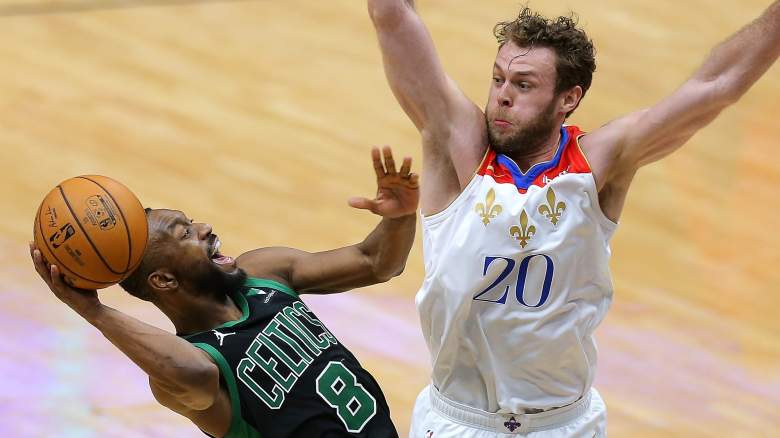
Turns out The Big Easy was not so easy in the end.
For the second straight game, the Boston Celtics had a big lead late into the second half. But unlike Friday night versus Atlanta, the Celtics were unable to withstand a vigorous comeback Sunday afternoon, losing 120-115 on the road in overtime to the New Orleans Pelicans after being up 24 points with 6:29 left in the third quarter.
Aside from the loss itself, perhaps most concerning of all is the trend of late-game, specifically fourth-quarter meltdowns that have plagued the Celtics all season.
Through 30 games, the Celtics currently rank 29th in fourth quarter Net Rating (NETRTG), which is the difference between a team’s points scored (OFFRTG) and points allowed (DEFRTG) per 100 possessions. Boston’s rating is -7.8. An atrocious figure and also a disturbing departure from recent history.
Last season the Celtics were ranked 7th in fourth quarter NETRTG, and the year before that they were 3rd with +5.3.
That means that this year’s Celtics are faltering most when it matters most — a big reason for their demonstrably mediocre 15-15 record.
“Listen, it’s enough of a trend. It’s enough of a concern. We’ve got to stop it,” said head coach Brad Stevens to reporters after the game. “Last year at this time we were in really good shape at those moments. This year we’re not. Has not been good.”
Struggles are Nothing New
Cold shooting, defensive lapses and an inability to run their offense in the face of aggressive traps from the Pelicans were the primary reasons for the Celt’s collapse Sunday, echoing some of the team’s problems overall this season.
Point guard Kemba Walker, despite living up to his All-Star billing the last few games after a very subpar start to the season, reverted back to his poor shooting ways against the Pelicans, particularly in the second half and overtime. Walker, who scored 14 points on 5-for-21 shooting overall, went 1-for-9 from the field including 0-for-7 from three in the fourth and overtime.
On the defensive end, the Celtics had trouble stopping New Orleans after the first half. Pelicans’ stars Zion Williamson and Brandon Ingram, who combined for only 17 points over the first 24 minutes, exploded in the second half and overtime to the tune of 44 points on a combined 17-for-29 shooting. Their aggression on offense put the Celtics on their heels and resulted in many open shots down the stretch, including a huge three from Ingram with 34 seconds remaining in overtime that put the Pelicans up 118-115.
“We can put anybody on our team in front of Zion 1-on-1 and he’s gonna get to where he wants to go and we’re gonna try to challenge it as well as we can,” said Stevens. “That’s why you have to guard him as a team and that’s when sometimes you help and you get burned. Like on the Ingram three when we pull in and we help and he makes the big shot.”
Tatum: Not Getting Stops Leads to Stagnation
Forward Jayson Tatum, who led Boston with 32 points and tied the game at the end of regulation with a floater in the lane, struggled in the second half with the Pelicans’ trapping half-court defense, often resulting in chaotic and rushed shots from him or his teammates.
“They were obviously way up to touch on especially Jason’s pick-and-rolls,” said Stevens. “But they were also up on Jaylen (Brown) some, and even a couple times, to be honest, we got blocking fouls and those could’ve been turnovers, too. But we’ve got to just balance out, make the right read, and trust the next play.”
Asked why he thought the Pelicans were able to pressure the Celtics more in the second half than they had in the first, Tatum attributed it to defensive shortcomings and playing too safe.
“I think that’s a result of not getting stops,” said Tatum. “Obviously once you get stops, steals, deflections, it’s easier to push the ball up, be fast, but when they were scoring, [forcing] you to take the ball out, things, I guess, can just naturally be slower.
“I think naturally when you get up like that you get more casual and you’re playing not to lose, instead of playing to win. Instead of being in attack mode and doing what got you that lead. You’re kinda playing not to mess us up, and that’s when you do. When you overthink it. So we just gotta play,” Tatum said.
The Celtics, who were 15-for-48 from the field in the second half and overtime, and committed eight turnovers over that span (after only two in the first half), won’t have much time to correct their late-game woes. Starting Tuesday, they play four games in six days, with the last one coming against a re-energized Washington Wizards squad led by league-leading scorer Bradley Beal.
READ NEXT: Celtics On The Wrong End Of History After Colossal Collapse


















Comments
Late-Game Implosions Are Celtics’ New Normal